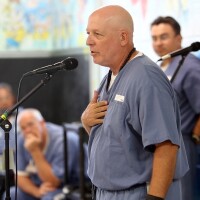On this Tuesday, April 12, edition of Sundial:
Ramadan
Muslims in South Florida and around the world are praying and fasting this month in observation of the holy month of Ramadan.
It’s a time of reflection, charity and unity. That aspect of unity and community that is so central to this season was threatened by the pandemic over the past two years.
Religious services and group dinners became virtual to mitigate the spread of COVID-19.
This year things are different. Many Muslims are planning to gather for prayer and group meals, where they can break their fast together.
“This year brought us a lot of hope,” said Imam Azhar Subedar, who is one of the founding members and an adviser to the South Florida Muslim Federation.
“To see people come together and the smiles on their faces, especially for the Eid prayer, which is an early morning prayer on the day of celebration where the masses come out and it’s just the colors and people are dressed up… that’s what makes it all worth it.”
Subedar recently wrote an op-ed for the Palm Beach Post about how Ramadan will be different this time around.

The importance of Sexual Assault Nurse Examiners
Every 68 seconds someone in the U.S. is sexually assaulted. That’s according to the National Sexual Violence Resource Center.
“[What] we have to do is train enough [nurses] because the burnout rate is very high,” said Dr. Tami Thomas, Associate Dean of Research and PhD Nursing program director for the Nicole Wertheim College of Nursing & Health Sciences at Florida International University, on Sundial back in 2019 when a program launched to train sexual assault nurse examiners.
Those are professionals who help secure evidence from survivors of sexual assault.
“If you do a sexual assault exam on an individual, you collect the forensic evidence, you make sure the patient has the support they need for follow up and you may get subpoenaed to court for months. So the process is long-standing and you can't just have one nurse in a hospital who can perform this all the time. So you have to have a small cadre of at least six people to make sure that things are covered.”
Florida had just over 40 certified sexual assault nurse examiners as of 2019.
This program from FIU has been working to increase the number of trained nurses for these cases. Thomas joined Sundial to discuss the impact the program has had since its launch.

Exchanging letters for change
A group of people in our community that often go unseen are those incarcerated. Prisons, by design, are out of sight.
Incarcerated people often have limited access to all of the communication tools that we have — phones, texts and social media within reach whenever we'd like.
One woman who devoted her life’s work to helping people in that situation communicate and express themselves through writing is Kathie Klarreich. She is the founder and executive director of the nonprofit Exchange for Change, a nonprofit that teaches writing courses and starts letter exchanges between those in prison and the outside community.
"If it's a short story or a prompt or a personal essay [the incarcerated students] respond with their own feelings about what it is that they read, they take on pseudonyms to protect their identity, and then they exchange papers and it becomes a running exchange of letters between the two sets of students for the entire semester," Klarriech said. "What it does for the incarcerated students is provide an opportunity for them to be heard, appreciated, recognized — and what it does for the outside student is allows that student to perhaps confront prejudices or biases that they didn't recognize they had and make a connection with someone that they might otherwise have no possibility of ever meeting."




